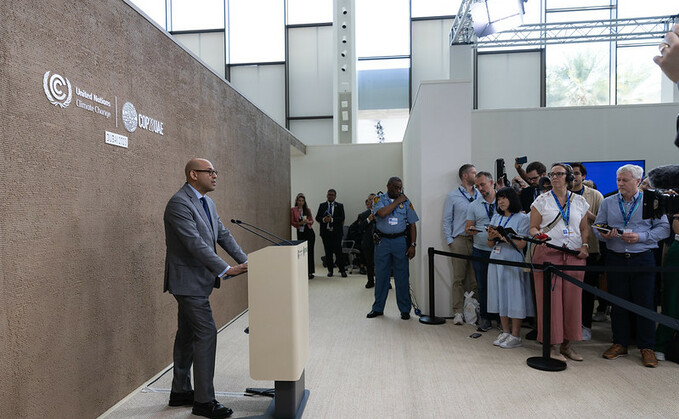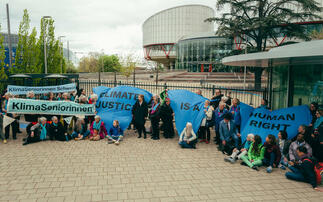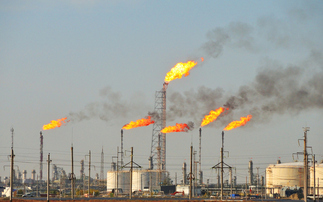Simon Stiell at the COP28 Climate Summit in Dubai / Credit: COP28/Kiara Worth
Simon Stiell acknowledges warning may sound 'melodramatic', but insists time is running out to avoid catastrophic climate impacts
The head of the UN climate change secretariat has issued his starkest warning yet over governments' continued failure to curb global emissions, warning "the next two years are so essential in saving our planet".
In a speech this afternoon at an event at the Chatham House think tank called "Two years to save the world", Simon Stiell, executive secretary of the UNFCCC, acknowledged some people may think the title was "overly dramatic - melodramatic, even".
But he insisted time was fast running out for governments and businesses to honour the commitments made under the Paris Agreement and avert potentially catastrophic climate impacts.
As such, he reiterated calls for governments to urgently strengthen their national climate action plans and boost flows of climate finance.
"As of today, national climate plans - called Nationally Determined Contributions or NDCs - in aggregate will barely cut emissions at all by 2030," he said. "We still have a chance to make greenhouse gas emissions tumble, with a new generation of national climate plans. But we need these stronger plans, now."
The speech forms part of the campaign from the UN and the troika of recent and upcoming COP Climate Summit hosts - the UAE, Azerbaijan, and Brazil - calling on governments to start work now on significantly strengthened NDCs that can be submitted ahead of the COP30 Summit next year.
"Let's consider for a moment what is up for grabs if we do make the next two years really count," Stiell said. "Bold new national climate plans will be a jobs jackpot and economic springboard to boost countries up that global ladder of living standards. In the face of crop-destroying droughts, much bolder climate action to curb emissions and help farmers adapt will increase food security, and lessen hunger. Cutting fossil fuel pollution will mean better health and huge savings for governments and households alike.
"The transformative potential of bold climate action - in tandem with steps to advance gender equality - is one of the fastest ways to move away from business as usual."
He also urged governments not to be distracted by seemingly competing priorities. "For those who say that climate change is only one of many priorities, like ending poverty, ending hunger, ending pandemics, or improving education, I simply say this: none of these crucial tasks - indeed none of the Sustainable Development Goals - will be possible unless we get the climate crisis under control," he said. "In fact, business-as-usual will further entrench the gross inequalities between the world's richest and poorest countries and communities that unchecked climate impacts are making much worse.
"These inequalities are kryptonite for cooperative global climate action, and every economy, every country and its people pays the price of that."
In addition, Stiell reiterated long-standing calls for governments to back reforms designed to boost flows of climate finance, arguing the upcoming Spring Meetings of the IMF and World Bank and the next round of G7 and G20 Summits provided an opportunity to lay the foundations for an ambitious new climate finance deal at this year's COP28 Climate Summit in Baku.
"A quantum leap this year in climate finance is both essential and entirely achievable," he said. "Every day, finance ministers, CEOs, investors, and development bankers direct trillions of dollars. It's time to shift those dollars from the energy and infrastructure of the past, towards that of a cleaner, more resilient future. And to ensure that the poorest and most vulnerable countries benefit."
He added that the World Bank and the IMF had the power to make changes that could lift hundreds of millions of people out of poverty and increase access to clean energy. "Progress in Washington DC on revising the World Bank's capital requirements could free up billions more for concessional lending without asking donors for more money," he explained. "Next, to help give countries the fiscal space they need for climate action, the IMF can help more countries deal with debts made worse by climate change and the pandemic. For example, by making more use of the Catastrophe Containment Relief Trust."
Stiell also urged the G20 "to rise to this moment" and avoid the temptation to use geopolitical challenges as "an excuse for timidity".
"Blame-shifting is not a strategy," he said. "Sidelining climate isn't a solution to a crisis that will decimate every G20 economy and has already started to hurt. So the financial firepower the G20 marshaled during the global financial crisis should be marshaled again and pointed squarely at curbing runaway emissions and building resilience now."
And ahead of a wave of major elections in the coming months, Stiell called on people everywhere to lobby for more ambitious climate action.
"When I say we have two years to save the world, it begs the question - who exactly has two years to save the world?" he said. "The answer is every person on this planet. More and more people want climate action right across societies and political spectrums, in large part because they are feeling the impacts of the climate crisis in their everyday lives and their household budgets."
Stiell cited a recent Gallup survey of 130,000 people in 125 countries, which found that 89 per cent want stronger climate action by governments.
"Yet too often we're seeing signs of climate action slipping down cabinet agendas," he added. "There is a disconnect - because in living rooms around the world, climate impacts and costs are rising quickly up the list of household worries. The only surefire way to get climate at the top of the cabinet agenda is if enough people raise their voices."
Attempts to set a deadline for 'saving the world' remain controversial among some commentators, who argue that while the impacts that would result from more than 1.5C of warming would be disastrous they would not necessarily prove apocalyptic. They also argue the escalating nature of climate impacts mean efforts to cut emissions would still be required even if the goals of the Paris Agreement are missed. Moreover, climate sceptic activists have repeatedly seized on previous countdowns to avert catastrophe to accuse environmentalists of scaremongering.
Others have suggested climate action is striving to protect civilisation and save the global economy, rather than the planet itself.
Writing on social media platform X yesterday, former UN climate chief Christiana Figueres wrote: "Mother Earth has been around for 4.5 billion years. She was perfectly happy before we got here, and she will be perfectly happy if we're ever foolish enough to pull the ejector seat and leave."
Could you or a colleague be recognised at the inaugural Women in Green Business Awards? You can submit your nominations for the awards now.










